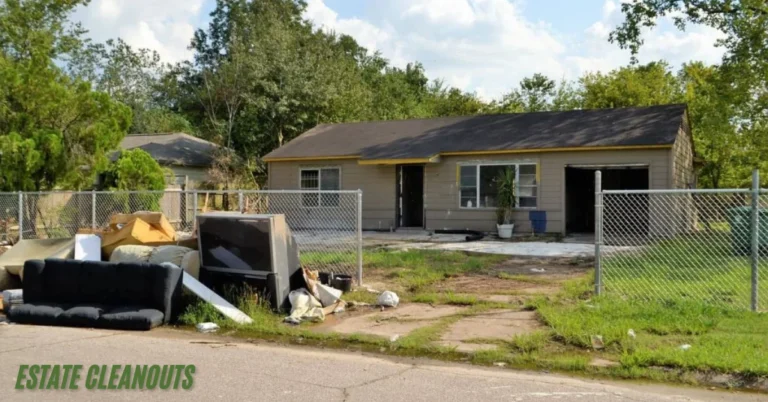Introduction to Estate Cleanouts
Navigating the world of estate cleanouts can feel overwhelming. Whether you are dealing with a loved one’s possessions after their passing or simply decluttering an inherited home, the process is often fraught with emotional challenges and tough decisions. Each item holds memories and stories that deserve to be honored, making it difficult to know where to start.
Estate cleanouts require careful planning and sensitivity. It’s not just about clearing out physical space; it’s also about processing emotions tied to those belongings. Understanding what lies ahead in this journey can help ease some of the burden. Let’s dive into the essential aspects of estate cleanouts, exploring how to approach them thoughtfully and effectively while ensuring respect for cherished memories along the way.
Reasons for Estate Cleanouts
Estate cleanouts often arise from significant life changes. When a loved one passes away, their belongings need careful attention and organization. This can be an overwhelming task for grieving family members.
Another common reason is downsizing. Individuals may decide to move into smaller homes or assisted living facilities. In such cases, sorting through years of possessions becomes essential.
Sometimes, relocation due to job changes or new opportunities prompts estate cleanouts as well. A fresh start often requires decluttering past items that no longer serve a purpose.
Additionally, hoarding situations can necessitate professional help in clearing spaces filled with excess belongings. Each scenario involves not just physical labor but also emotional considerations affecting those involved in the process. Recognizing these reasons aids in understanding the complexity behind every estate cleanout journey.
Steps to Take Before Beginning the Cleanout Process
Before diving into an estate cleanout, it’s essential to take a moment for preparation. Start by gathering all relevant documents related to the property. This includes wills, insurance policies, and any legal papers that might impact the process.
Next, communicate with family members or heirs. Discuss your plans and expectations clearly to avoid misunderstandings later on. Everyone’s input can help in making informed decisions.
Create a timeline for the cleanout. Setting specific dates can keep you organized and motivated throughout this emotionally charged task.
Inventory valuable items beforehand. Take photos or list them out to determine what should be kept or appraised later on. By approaching the cleanout with a well-thought-out plan, you’ll find it easier to navigate this challenging journey.
Hiring a Professional Estate Cleanout Service
When faced with an estate cleanout, the process can feel overwhelming. Hiring a professional service can ease that burden significantly.
These experts understand the intricacies involved. They bring experience and knowledge of local regulations concerning disposal and donation.
A professional team works efficiently, saving you time and energy. Their organized approach ensures items are sorted properly, from valuable antiques to everyday household goods.
Additionally, these services often provide emotional support during tough times. They handle sensitive situations with care and respect for your feelings.
Choosing the right company is crucial. Look for reviews or ask for recommendations to find a team that aligns with your needs.
With professionals by your side, you can focus on what truly matters while they manage the logistics of an estate cleanout effectively.
Sorting and Organizing Items
Sorting and organizing items during an estate cleanout can feel overwhelming. Start by breaking everything down into manageable categories: keep, donate, sell, and discard.
As you sift through belongings, be mindful of the emotional weight each item carries. Some objects may hold cherished memories; others might just take up space. Allow yourself to pause when something resonates deeply.
Label boxes clearly to avoid confusion later on. This simple step saves time in the long run and keeps your efforts organized.
Involve family or friends if possible—they can provide support as well as a fresh perspective on what should stay or go.
Remember that it’s not about keeping everything but rather curating a collection of meaningful items that reflect the life lived within those walls. Each choice brings clarity amidst chaos, guiding you toward a more intentional future.
Dealing with Difficult Emotions During the Cleanout
Going through an estate cleanout can stir up a whirlwind of emotions. Each item tells a story, holding memories that can be both comforting and painful.
It’s natural to feel overwhelmed. Grief often intertwines with nostalgia as you sift through belongings once cherished by a loved one. Allow yourself to experience these feelings without judgment.
Take breaks when needed. Step outside for fresh air or enjoy a moment of silence to regroup your thoughts. Sharing the process with family or friends can also provide support, turning solitude into connection.
Consider keeping special items that resonate deeply with you while letting go of others that may weigh you down emotionally. Remember, it’s okay to seek help from professionals trained in handling these sensitive situations if things become too heavy to manage alone.
This journey is not just about clearing space; it’s about honoring the past while making way for healing and new beginnings.
Proper Disposal of Unwanted Items
Disposing of unwanted items during an estate cleanout requires careful consideration. Simply tossing everything in the trash isn’t always the best choice. Many items can be recycled or repurposed, which is not only environmentally friendly but also respectful to the memories associated with them.
Start by categorizing your belongings into groups: recyclable materials, donations, and trash. For electronics and hazardous waste, check local regulations for proper disposal methods. Some communities offer special collection days for these items.
Consider donating usable goods to charities or local shelters. They often appreciate household items that still have life left in them.
For bulky furniture or large appliances, look into services that specialize in removing such items responsibly.
Taking the time to dispose of possessions thoughtfully makes a significant difference—not just for you but also for those who may benefit from what you no longer need.
Finalizing the Cleanout and Preparing for Sale or Donation
Once the estate cleanout is complete, it’s time to focus on what happens next. If you’re considering selling items, take quality photos and write clear descriptions. Online marketplaces provide great platforms for reaching potential buyers.
For donations, research local charities that accept household goods. Many organizations will even pick up items directly from your home, making this process easier.
Make sure all paperwork related to sales or donations is organized and accessible. Keep receipts if you choose to donate; they can be helpful for tax deductions later on.
If you’re preparing a property for sale after the cleanout, consider minor repairs or staging tips to make it more appealing. A well-presented space not only attracts buyers but also helps maximize its value in the market.
Resources for Help and Support
When facing the daunting task of estate cleanouts, seeking help can make a world of difference. Numerous resources are available to ease the burden.
Local organizations often offer support groups for those dealing with loss. These gatherings provide a space to share experiences and emotions, helping individuals feel less isolated during this challenging time.
Online forums and social media groups also serve as valuable platforms. Connecting with others who have been through similar situations can offer insights and tips on managing the physical and emotional aspects of cleanouts.
Professional services abound as well. Estate sale companies not only assist in sorting items but also handle sales, allowing families to focus on healing rather than logistics.
Consider reaching out to therapists or counselors specializing in grief. They can guide you through emotional turbulence while navigating this significant transition in life.
Conclusion: The Importance of Compassion
Navigating the process of estate cleanouts is never easy. Emotions run high, and memories can flood back with every item you touch. It’s essential to approach this task with compassion—for yourself and for those who may be grieving.
This journey involves more than sorting belongings; it’s about honoring a life and cherishing moments shared. Understanding that everyone involved might face their own set of emotions can foster a supportive environment during what can often feel like an isolating experience.
Consider reaching out to friends or family for help. Sharing stories as you sort through items creates a sense of connection amid the chaos. Professional services are also available to ease some burden, but remember that emotional support is just as vital.
Compassionate handling of this situation not only preserves memories but allows space for healing. Whether you’re preparing items for donation or deciding what should remain, prioritizing kindness throughout the process will create lasting peace in your heart and mind.
Estate cleanouts represent significant transitions—both physically and emotionally. Taking time to reflect on what each item represents makes all the difference in navigating this difficult yet necessary journey smoothly.
FAQs
Q: What is an estate cleanout?
Ans: An estate cleanout involves clearing out belongings from a home after significant life events, such as death, downsizing, or eviction.
Q: Who typically handles estate cleanouts?
Ans: Family members often manage cleanouts, but professional estate cleanout services can provide assistance and alleviate the burden.
Q: What items are usually removed during an estate cleanout?
Ans: Commonly removed items include furniture, personal belongings, documents, and anything that is no longer needed or wanted.
Q: How can I prepare for an estate cleanout?
Ans: Start by sorting through belongings, categorizing items to keep, donate, sell, or discard, and creating a plan for the cleanout process.
Q: Are there emotional challenges during estate cleanouts?
Ans: Yes, estate cleanouts can be emotionally taxing as they often involve dealing with memories and the loss of a loved one or significant change.

